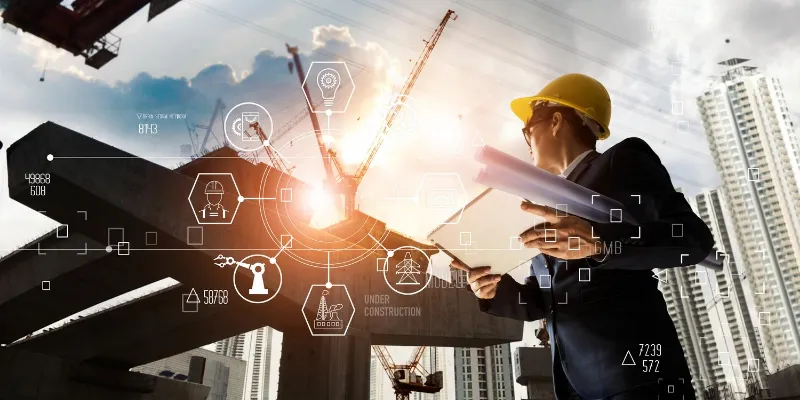Digitisation of real estate: A new façade for new times
How the real estate sector is betting big on AI to bring about transformational changes across the entire construction life cycle.

Amidst the trepidations of the pandemic worldwide, technology has indeed proven to be indispensable. Technological advancements have brought a huge wave of change in our daily lifestyle and working culture.
At the same time, diverse applications of AI (Artificial Intelligence) and Machine Learning have opened endless possibilities in the realm of businesses.
IT (Information Technology) has proven to be instrumental and a cost-effective tool across industries – big and small through its various applications such as AI, ML, etc. This reliance on automation and machine learning has been shaping the new ventures of many segments of industries and organisations, and real estate is no exception.
In times of COVID-19, as we stand on the verge of a major economic collapse, various lockdowns along with new socio-economic norms have taken a toll on all businesses including those in the real estate sector.
In such precarious times, automation and machine learning have given shape to a variety of innovation across multiple segments of industries and have also managed to keep businesses afloat.
Why Artificial Intelligence (AI) now?
In 1958, American computer scientist Frank Rosenblatt created the perceptron algorithm, the first algorithmic model that could learn on its own. This was the birth of AI.
Since then, AI has been seen as big an invention as electricity. Till 2010, AI did not live up to its much-hyped potential but in the last decade, four things converged: huge data generation, tremendous increase in computing power, cheap storage, and algorithmic advances. This propelled AI from hype to reality.
Now AI has become an integral part of every business, not just for improving operational efficiency or profit, but also for key decision making. No business can afford to ignore AI anymore.
AI and digitisation in Real Estate (RE)
According to the Morgan Stanley Digitisation Index, Real Estate is the second least-digitised industry world over. AI applications are only as powerful as the quantity and quality of the data sets fed into them. Siloed, unstructured and often expensive data is RE’s main barrier to onboarding the technology.
AI in post-construction has been trending for a few years now in the form of smart home systems and IoT (Internet of Things) with application such as ability to control temperature, lights, electricity, locks, and robot vacuums -- the list goes on and on.
Applying AI beyond post-construction
As in every other sector, improved data transparency and standardisation are important to the RE industry. One of the most prominent features of AI is its ability to predict the future. RE is an industry of high stakes and high rewards, where the ability to predict outcomes is especially valuable.
One of the largest challenges faced by RE are time and cost overruns. With the help of currently available AI technology, RE businesses can generate project schedule optimisers which can consider millions of alternatives for project delivery and enhance overall project planning.
AI can aid in ‘smart construction’ through drone surveys, 3D maps and models, extracting blueprints, and simulating construction plans, enhancing quality in construction and predicting critical events and project risks. These can also help identify unsafe spots and practices on the site and work towards avoiding on-site accidents and improving worker safety through focused training, monitoring and preventive measures.
Enhanced analytics platforms can collect and analyse data from sensors to understand signals and patterns to deploy real-time solutions, cut costs, prioritise preventative maintenance, and prevent unplanned downtime.
The most dynamic aspect of the RE industry is understanding the customer. Thanks to AI and Big Data, RE businesses will now be able to accurately analyse customer behaviour, distinguish the ones really intending to buy a property from the ones just browsing out of curiosity (and thus save substantial time and customer servicing costs), and also identify the types of property customers are going for.
Ecosystem
The current ecosystem presents tremendous opportunity to adopt the just-in-time concept in supply chain and logistics. Transportation and manufacturing industries, for example, are already in the process of breaking down the barriers between them and operating more as symbiotic ecosystems.
Real estate companies and other suppliers/contractors/consultants can work to create similar ecosystem which has open API data sharing, unleashing efficiencies, reducing oversupply, and increasing predictability of shipments -- all resulting in impressive reductions in costs, logistical burdens, and variability.
Further, integration with the regulatory framework and government systems by leveraging the government’s Digital India stack will enable a more efficient and productive value chain.
Integrations with financial institutions systems and automating buyers vetting processes by processing data from multiple digital sources and credit rating agencies will enhance transparency and reliability.
Way forward for RE industry
The most suitable and simple mantra for the current times as well as the future is fourfold: adopt E2E digitisation and create a ‘single source of truth’ system; merge all streams of information into one ‘data lake’; track, analyse and glean insights from every piece of information obtained in the industry aka the big data strategy; and apply Robotic Process Automation to get done with routine tasks.
The faster real estate firms make data interoperable and enforce standards, the faster buyers, RE firms, and investors will be able to reap AI’s exceptional benefits.
(Disclaimer: The views and opinions expressed in this article are those of the author and do not necessarily reflect the views of YourStory.)









